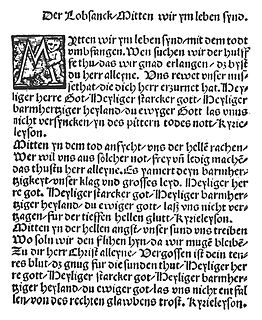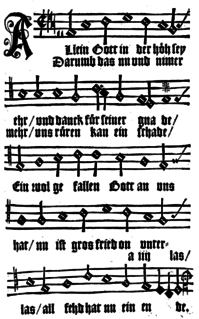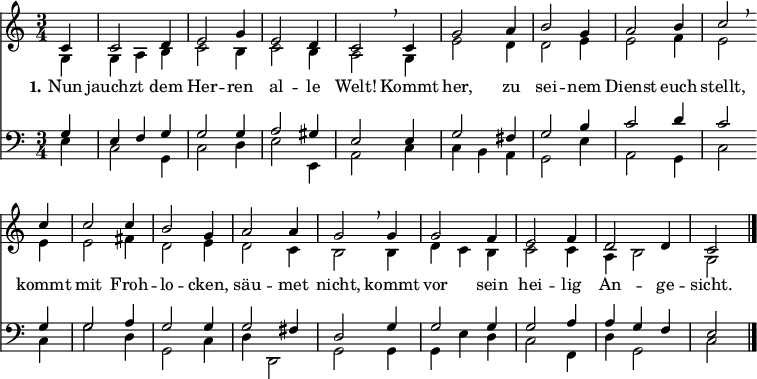"Old 100th" or "Old Hundredth" is a hymn tune in long metre, from second edition of the Genevan Psalter. It is one of the best known melodies in many occidental Christian musical traditions. The tune is usually attributed to the French composer Louis Bourgeois.

"Nun komm, der Heiden Heiland" is a Lutheran chorale of 1524 with words written by Martin Luther, based on "Veni redemptor gentium" by Ambrose, and a melody, Zahn 1174, based on its plainchant. It was printed in the Erfurt Enchiridion of 1524.
David Denicke was a German jurist and hymn writer.
"Nun lob, mein Seel, den Herren" is a Lutheran hymn written in German by the theologian and reformer Johann Gramann in 1525. It was published in 1540 and appears in 47 hymnals. A translation by Catherine Winkworth, "My Soul, now Praise thy Maker!", was published in 1863.

"O Welt, sieh hier dein Leben" is a Lutheran Passion hymn in German by Paul Gerhardt. In 16 stanzas of 6 lines, it was first published in 1647 in Johann Crüger's Praxis pietatis melica. The hymn is known as the source for chorales in Bach's Passions. It was translated to English in several versions, for example "O, World! behold upon the tree" by Catherine Winkworth in 1858.

"Christ ist erstanden" is a German Easter hymn, and is possibly the oldest Christian liturgical German song. It has inspired music by composers such as Ludwig Senfl and Heinrich Schütz through to modern composers such as Oskar Gottlieb Blarr and Enjott Schneider, and has appeared in 45 hymnals, including the current German Catholic and Protestant hymnals. Translations and paraphrases include a version by Catherine Winkworth which has appeared in 231 hymnals. "Christ ist erstanden" also inspired Martin Luther to write "Christ lag in Todes Banden", deriving the melody from it.

"Mitten wir im Leben sind mit dem Tod umfangen" is a Lutheran hymn, with words written by Martin Luther based on the Latin antiphon "Media vita in morte sumus". The hymn in three stanzas was first published in 1524. The hymn inspired composers from the Renaissance to contemporary to write chorale preludes and vocal compositions. Catherine Winkworth translated Luther's song to English in 1862. It has appeared in hymnals of various denominations.

"Allein Gott in der Höh sei Ehr" is an early Lutheran hymn, with text and melody attributed to Nikolaus Decius. It was intended as a German version of the Gloria part of the Latin mass. Decius wrote three stanzas, probably in 1523, while a fourth was added—probably by Joachim Slüter.

"In dich hab ich gehoffet, Herr" is a Lutheran hymn in seven stanzas, written by Adam Reusner and first published in 1533. He paraphrased the beginning of Psalm 31. It was first sung to the melody of a Passion hymn. The melody connected with the hymn in 1560 was derived from models dating back to the 14th century. A third melody from 1608 became a hymn tune for several other songs and translations to English. In the German Protestant hymnal Evangelisches Gesangbuch, the hymn appears as EG 257 with the second melody. Johann Sebastian Bach used the second and third melodies in chorale preludes, and the third also in cantatas and the St Matthew Passion.

"Nun danket all und bringet Ehr" is a German Lutheran hymn in nine stanzas, with a text written by Paul Gerhardt. It was first published in 1647, in Johann Crüger's Praxis pietatis melica which was the first publication of hymns by Gerhardt. In the 1653 edition, Crüger added a melody that he composed. As a general song of thanks, the song has appeared in several hymnals, including the German Protestant hymnal Evangelisches Gesangbuch and the Catholic hymnal Gotteslob. It has inspired musical settings by composers from the 17th to the 21st century. Johann Sebastian Bach used the first stanza in a cantata, however with the melody of "Lobt Gott, ihr Christen alle gleich", Hugo Distler composed a chorale cantata, and Günter Berger based a toccata for organ on it.
"Den Herren will ich loben" is a Christian hymn by Maria Luise Thurmair, based on the Magnificat and set to a 1613 melody by Melchior Teschner, which was used for "Valet will ich dir geben". The hymn in three stanzas of eight lines was first written in 1954, and revised in 1971. It appeared in the Catholic hymnal Gotteslob in 1975, and in the current Gotteslob, but also in a German Protestant hymnal. A general song of praise, it has been set to music several times.

"Macht hoch die Tür" is a German popular Advent hymn, written in Ducal Prussia in the 17th century. The incipit is the first line, "Macht hoch die Tür, die Tor macht weit. The lyrics were written by Georg Weissel in 1623, for the inauguration of the Altroßgärter Kirche in Königsberg. The melody that is now associated with the text appeared first in 1704 in the hymnal by Johann Anastasius Freylinghausen.
"Mein ganzes Herz erhebet dich" is the beginning of German hymns to a melody from the 16th century, which paraphrase Psalm 138. They are part of Protestant and Catholic hymnals.

"Dein Lob, Herr, ruft der Himmel aus" is a German Catholic hymn. Adolf Lohmann adapted a 1659 hymn by the Jesuit astronomer Albert Curtz, who paraphrased Psalm 19. The melody appeared in Augsburg in 1669. It was No. 1 in the 1938 hymnal Kirchenlied and is part of the German Catholic hymnal Gotteslob as GL 381.
"Nun lässest du, o Herr" is a Christian hymn by Georg Thurmair written in 1966 as a paraphrase of the Nunc dimittis canticle. It was part of the German Catholic hymnal Gotteslob of 1975 as GL 660 with a 16th-century melody by Loys Bourgeois. With this melody, it is also part of the Protestant hymnal Evangelisches Gesangbuch as EG 695. It is part of the second edition of the Gotteslob as GL 500, with a new 1994 melody.
"Nun singt ein neues Lied dem Herren" is a Christian hymn with German text by Georg Thurmair. He based it on Psalm 98 and wrote it in 1967 to match a traditional 16th-century melody. The song is part of German hymnals, including Gotteslob, and songbooks.

"Macht weit die Pforten in der Welt" is a Christian hymn with German text by Albert Knapp written for the Basel Mission and first published in 1829. It appeared in 19th-century German hymnals, to be sung with the melody of "Wie schön leuchtet der Morgenstern". It appeared in the 1938 hymnal Kirchenlied with a new melody by Adolf Lohmann. The song is part of the 2013 German Catholic hymnal Gotteslob.

"Mit Ernst, o Menschenkinder" is an Advent hymn by Valentin Thilo. It partly paraphrases the call to penitence by John the Baptist. The text was first published in 1642 in the collection Preußische Festlieder. The different melody that later became popular dates back to 1557.

"Nun lasst uns gehn und treten" is a Lutheran hymn for New Year's Day by Paul Gerhardt. It appeared first in 1653 in Praxis Pietatis Melica. It is sung to the melody of "Nun laßt uns Gott dem Herren".
"Nun saget Dank und lobt den Herren" is a Christian hymn in German, paraphrasing Psalm 118. The German text was originally written by Ambrosius Lobwasser in the 16th century as a translation, meant to match the music from the French Genevan Psalter. It was rewritten and shortened in the 20th century by Peter Enderlin to be used in a hymnal of the Swiss Reformed Church. The song is included in German hymnals of various denominations.












